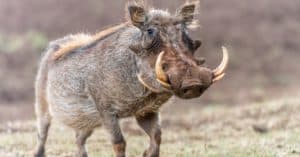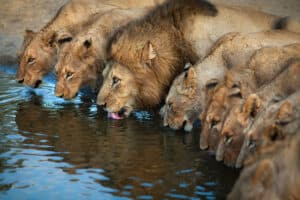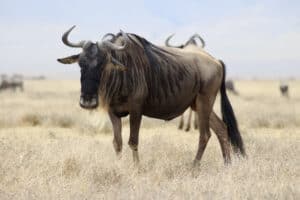Beautiful and fearsome, the lynx is a type of wild big cat that eats a surprising number of things. Quiet and capable hunters, these predators love one food in particular more than all others.
So, what do lynx eat? Lynx eat hares, deer, birds, and carrion. They are carnivores, and very capable hunters as well. Given the often harsh environments that lynx live in, they will eat most any meat that they can get!
But how much can these relatively small cats eat? And do lynx ever harm humans? Let’s learn more about this cat now.
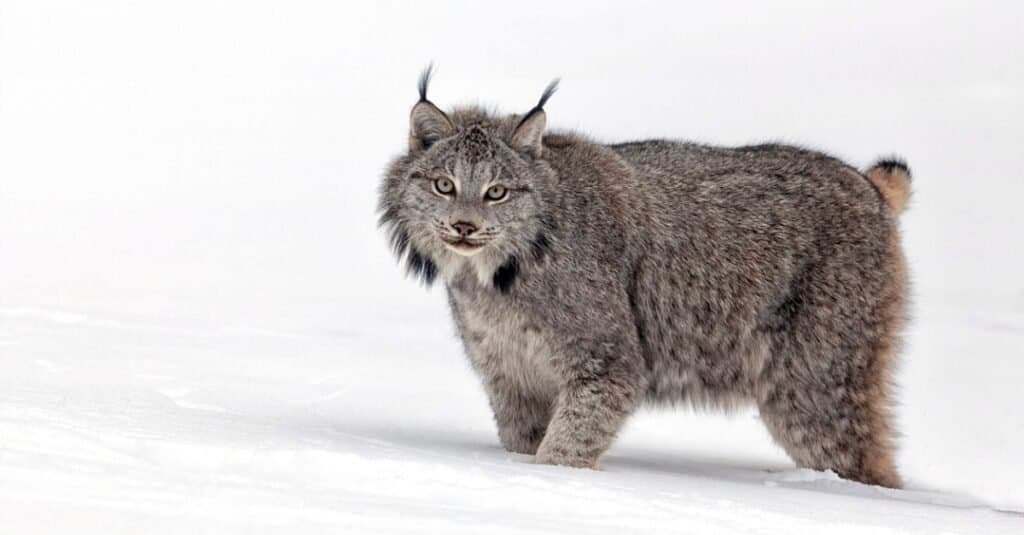
©iStock.com/Lynn_Bystrom
What Does a Lynx Eat?
A lynx eats the snowshoe hare, deer, caribou, dead animals, birds, and more. They are carnivores and excellent hunters, capable of hunting year round, even in snowy conditions.
Lynx can hear fantastically, using the extra hair located in their ears as acoustic help. They can also see a mouse from over 200 feet away, their eyesight another fantastic sensory boost.
Lynx are opportunistic eaters and won’t say no to eating any type of meat or prey available to them. However, they prefer to eat snowshoe hares or other types of rabbits the most. But more on that later.
A Complete List of 10 Foods Lynx Eat
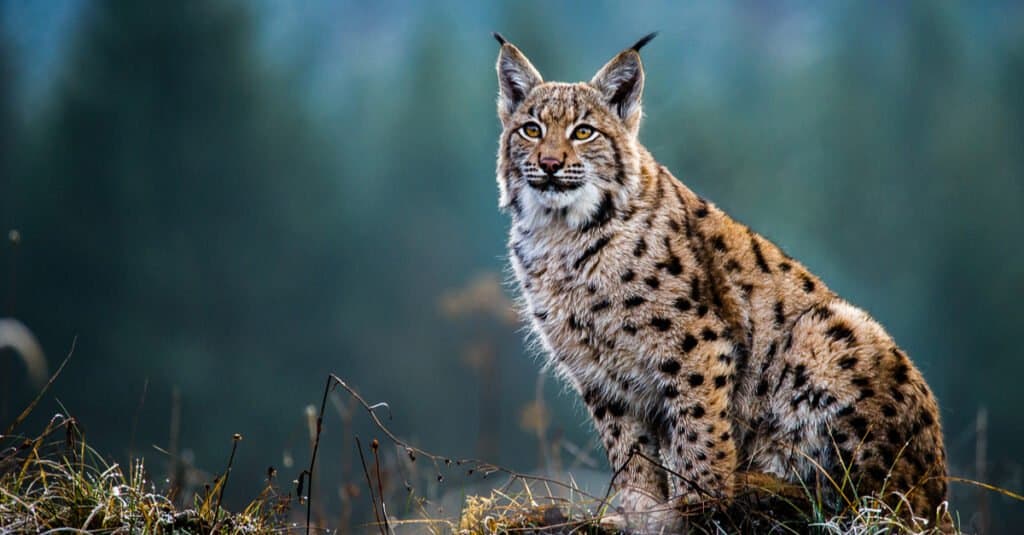
©Tomas Hulik ARTpoint/Shutterstock.com
Here is a complete list of foods that lynx have been known to eat:
Lynx crave snowshoe hares enough to make up a large percentage of their diet. Their population can even fluctuate alongside the snowshoe hare population. If the hare’s population declines, so does the Canadian lynx population!
However, this doesn’t mean that they don’t eat a wide variety of other things as well. They will hunt any manner of small rodents using their stealth and quiet abilities. They aren’t particularly fast animals, but they can hunt in other ways.
Their long legs allow them to traverse very snowy distances for great periods of time. According to The Journal of Wildlife Management, a lynx is known for traversing an average of 3 miles in the wintertime in order to find prey.
They also jump an average of 5-7 feet while hunting in order to snatch their prey. It depends on the type of prey they are hunting whether or not they jump very far, The Journal of Wildlife Management goes on to say.
How Much Does a Lynx Eat?
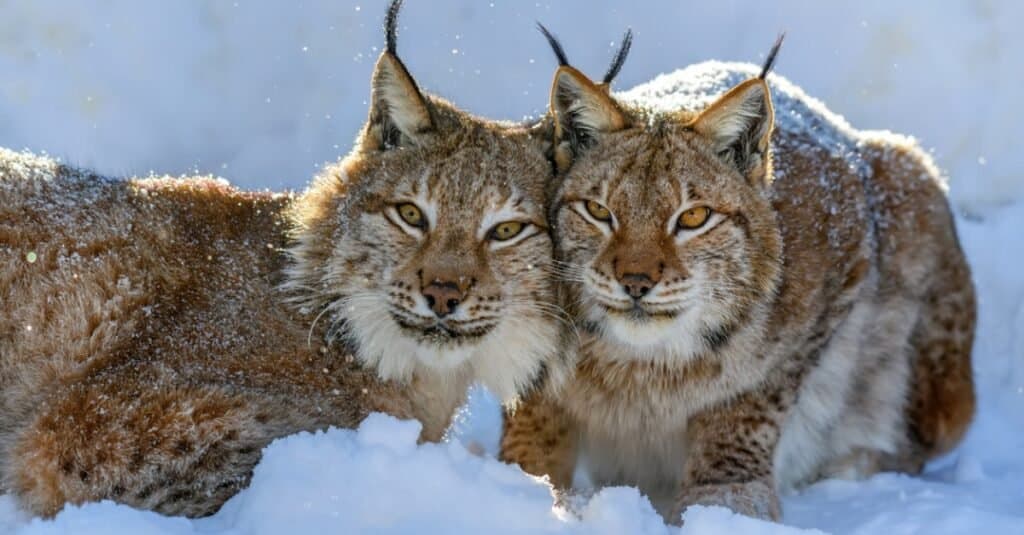
Lynx crave snowshoe hares enough to make up a large percentage of their diet.
©iStock.com/Byrdyak
The amount of food a lynx eats depends on the season and available food. For example, some lynx have been observed as eating an entire snowshoe hare in one sitting, while others have been seen storing their hares for later consumption.
Lynx also share their food with their young. According to Ecography, mother lynx with babies are 80% more likely to share a deer carcass with their young than adult male lynx. Adult males are less likely to eat carcasses overall, preferring to hunt on their own terms.
Given that lynx populations are so affected by the snowshoe hare population, it is safe to assume that a lynx will eat more hares than we know if the population can withstand it. The snowy seasons may also affect their eating habits as well.
The Northeastern Naturalist suggests that lynx will opportunistically prey on deer species as well. They observed a lynx hunting a deer in deep snow, and noticed that the deer was impeded by such large snowbanks.
The lynx has no trouble traversing these winter conditions, given their large snowshoe-like feet. They took advantage of the struggling deer and hunted it with ease, suggesting that they may feed on many more mammals that can’t handle snowy conditions.
Are Lynx Dangerous to Humans?
Lynx prefer to leave people alone, but they can be dangerous to humans if they are cornered or threatened. Just like all big cats, lynx have the potential for doing harm, given their large claws and predatory nature.
However, lynx are solitary, quiet, and shy creatures. They much prefer to leave humans alone, but they may perform out of character if they are surprised or otherwise threatened.
Speaking of threats to lynx, humans are a lynx’s main predator. Lynx are often hunted even to this day as big game. Their furs are still highly prized, even though this creature is elusive and hard to find out in the wild.
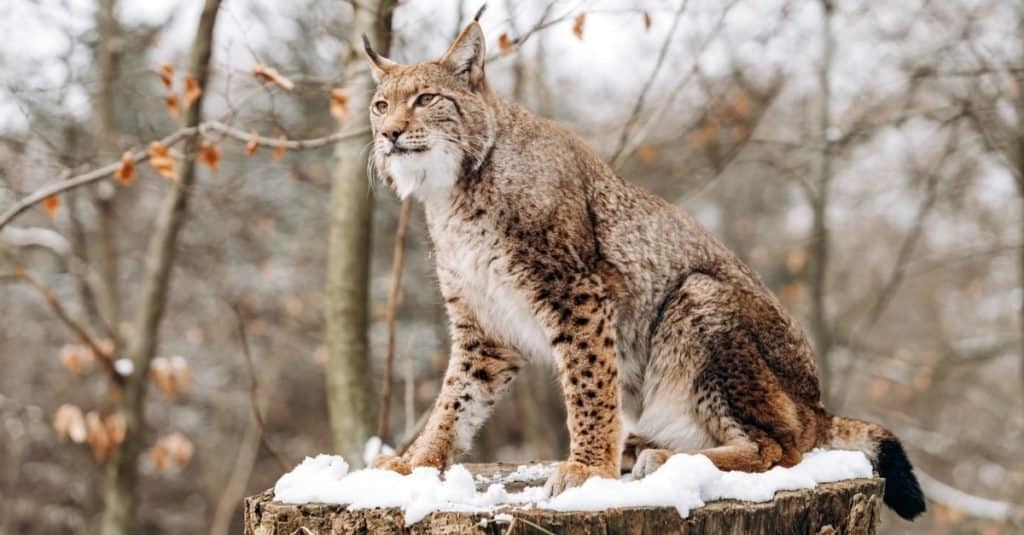
.
©Ewa Studio/Shutterstock.com
What Do Lynx Eat in Winter?
Lynx eat the same foods in winter, though their prey may be more scarce. Snowshoe hares are accustomed to living in cold environments however, which may be why they are such a prized food source of the lynx.
As stated already, lynx populations are directly connected to snowshoe hare populations. According to Arctic, lynx can even absorb a prey snowshoe hare’s fear and stress when they eat it- their cortisol or stress hormone levels rose during peak hunting seasons.
This surprised many scientists, as they assumed a lynx’s cortisol levels would be highest toward the end of the season, when food is more scarce and a lynx might be feeling more stressed out about getting a good meal.
But this was not the case- their stress levels remained highest during peak hunting time, when hares were at their most abundant. This could indicate that stress does indeed affect prey animals, and that stress is absorbed into a lynx’s body as well!
The photo featured at the top of this post is © iStock.com/Lynn_Bystrom
Thank you for reading! Have some feedback for us? Contact the AZ Animals editorial team.




